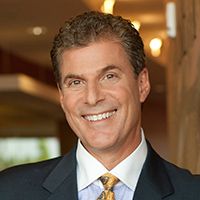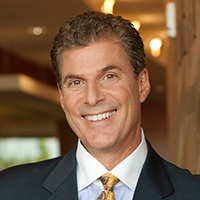What's Keeping Investors Up At Night?
People tend to worry about things they cannot control, but they should focus instead on proper diversification and lowering fees.

Profit and prosper with the best of Kiplinger's advice on investing, taxes, retirement, personal finance and much more. Delivered daily. Enter your email in the box and click Sign Me Up.
You are now subscribed
Your newsletter sign-up was successful
Want to add more newsletters?

Delivered daily
Kiplinger Today
Profit and prosper with the best of Kiplinger's advice on investing, taxes, retirement, personal finance and much more delivered daily. Smart money moves start here.

Sent five days a week
Kiplinger A Step Ahead
Get practical help to make better financial decisions in your everyday life, from spending to savings on top deals.

Delivered daily
Kiplinger Closing Bell
Get today's biggest financial and investing headlines delivered to your inbox every day the U.S. stock market is open.

Sent twice a week
Kiplinger Adviser Intel
Financial pros across the country share best practices and fresh tactics to preserve and grow your wealth.

Delivered weekly
Kiplinger Tax Tips
Trim your federal and state tax bills with practical tax-planning and tax-cutting strategies.

Sent twice a week
Kiplinger Retirement Tips
Your twice-a-week guide to planning and enjoying a financially secure and richly rewarding retirement

Sent bimonthly.
Kiplinger Adviser Angle
Insights for advisers, wealth managers and other financial professionals.

Sent twice a week
Kiplinger Investing Weekly
Your twice-a-week roundup of promising stocks, funds, companies and industries you should consider, ones you should avoid, and why.

Sent weekly for six weeks
Kiplinger Invest for Retirement
Your step-by-step six-part series on how to invest for retirement, from devising a successful strategy to exactly which investments to choose.
Last year, during a client coaching event, I asked participants to write down on index cards what was keeping them up at night.
When I collected them, the top three answers were:
- ISIS;
- a cyber attack on the U.S. power grid; and
- the deficit.
These are, of course, big problems over which these people have no control. But we could, and did, talk about how national and world affairs affect their financial affairs, and we discussed how they could adjust their planning accordingly.
From just $107.88 $24.99 for Kiplinger Personal Finance
Become a smarter, better informed investor. Subscribe from just $107.88 $24.99, plus get up to 4 Special Issues

Sign up for Kiplinger’s Free Newsletters
Profit and prosper with the best of expert advice on investing, taxes, retirement, personal finance and more - straight to your e-mail.
Profit and prosper with the best of expert advice - straight to your e-mail.
As a financial coach as opposed to a more traditional financial adviser, sure, my focus is still on helping my clients accumulate wealth and to preserve and protect their assets from market losses. But I also talk to people about broader issues—their hopes and concerns about money and the world in general—and it actually helps to take the emotion out of planning.
In my quarterly coaching events and monthly public seminars I get a chance to talk about the things people shouldn't get alarmed about just because they pop up during the 24-hour news cycle. And if we can, we set the record straight on the "facts" they pick up from a variety of sources, including friends or on Facebook.
For example, I'll ask, "Who owns most of our country's debt?" The most popular answer is China. But in reality, the biggest holders of U.S. debt are the Social Security trust funds and other federal government accounts, as well as the Federal Reserve System. China owns less than 8% of our debt.
We'll talk about the election, and which party is better for Wall Street. I tell them I believe that the market is bigger than the presidency, that Wall Street likes bipartisanship and checks and balances. Yes, right now we're seeing some volatility because the markets don't like uncertainty. But after things settle down, so will Standard & Poor's 500-stock index. But it's also important to diversify—and we talk about how people can fall short sometimes by investing too heavily in just one or two asset classes.
Another popular topic is gold because in temperamental times, when the market goes down, you'll see a lot of commercials touting this precious metal as a safe haven, a cure for everything. People wonder if they should change their financial plan and invest more in gold. But that market is as subject to speculation and volatility as other markets. At one of our seminars, we asked, "Gold: What is it good for?" The answer: Gold is good for jewelry.
Of course, inflation is always a good topic. Right now, interest rates are low and paying at the pump isn't that painful. People just don't see inflation coming. But I'll ask: Have you noticed that cereal boxes are getting smaller? I've enjoyed Clif Bars for as long as I can remember, and they are definitely getting smaller! Inflation is there; it's just harder to see.
Lastly, not everyone has a pension anymore—those days are over! How do retirees produce income off of their assets during these volatile times? During the accumulation phase of life, pre-retirees are contributing to their 401(k)s, IRAs and other retirement accounts.
Once you retire, you have entered what I like to call the harvesting phase. This is when you should consider enlisting the help of a financial adviser or coach. Increasingly, people are retired for almost as long as they worked. So it isn't just about what you make; it's also about what you don't lose. People are losing their hard-earned savings in ways they don't even realize. I find that investors are often oblivious to all the hidden fees in their accounts, and they fail to recognize the threat inflation has on their future spending. With the odds in your favor for a long life, it's important to have a financial coach help create an income plan that you don't outlive.
You should strive to alleviate concerns about how world affairs might affect financial affairs by focusing on the things you can do something about. With a financial coach on your side who can help take the emotion out of investing and create a customized retirement income plan, you, too, can get on the path toward financial independence!
Alfie Tounjian is a Certified Financial Planner™, an Investment Adviser Representative and founder and president of Advantage Retirement Group and Tounjian Advisory Group LLC. He is also a licensed insurance professional.
Investment advisory services offered through Tounjian Advisory Group LLC, a Registered Investment Adviser.
Kim Franke-Folstad contributed to this article.
Profit and prosper with the best of Kiplinger's advice on investing, taxes, retirement, personal finance and much more. Delivered daily. Enter your email in the box and click Sign Me Up.

Alfie Tounjian is a Certified Financial Planner™, an Investment Adviser Representative and founder and president of Advantage Retirement Group and Tounjian Advisory Group LLC. He is also a licensed insurance professional. He has been in the financial services industry for more than 30 years. His practice focuses on wealth accumulation, asset protection, retirement income strategies, IRA and 401(k) rollovers, life insurance and annuities. Tounjian shares his financial philosophy weekly on his "Saving the Investor" television and radio shows. He resides in Fort Myers, Florida, with his wife, Tommie, and their son.
-
 Over 65? Here's What the New $6K 'Senior Deduction' Means for Medicare IRMAA Costs
Over 65? Here's What the New $6K 'Senior Deduction' Means for Medicare IRMAA CostsTax Breaks A new deduction for people over age 65 has some thinking about Medicare premiums and MAGI strategy.
-
 U.S. Congress to End Emergency Tax Bill Over $6,000 Senior Deduction and Tip, Overtime Tax Breaks in D.C.
U.S. Congress to End Emergency Tax Bill Over $6,000 Senior Deduction and Tip, Overtime Tax Breaks in D.C.Tax Law Here's how taxpayers can amend their already-filed income tax returns amid a potentially looming legal battle on Capitol Hill.
-
 5 Investing Rules You Can Steal From Millennials
5 Investing Rules You Can Steal From MillennialsMillennials are reshaping the investing landscape. See how the tech-savvy generation is approaching capital markets – and the strategies you can take from them.
-
 When Estate Plans Don't Include Tax Plans, All Bets Are Off: 2 Financial Advisers Explain Why
When Estate Plans Don't Include Tax Plans, All Bets Are Off: 2 Financial Advisers Explain WhyEstate plans aren't as effective as they can be if tax plans are considered separately. Here's what you stand to gain when the two strategies are aligned.
-
 Counting on Real Estate to Fund Your Retirement? Avoid These 3 Costly Mistakes
Counting on Real Estate to Fund Your Retirement? Avoid These 3 Costly MistakesThe keys to successful real estate planning for retirees: Stop thinking of property income as a reliable paycheck, start planning for tax consequences and structure your assets early to maintain flexibility.
-
 I'm a Financial Planner: These Small Money Habits Stick (and Now Is the Perfect Time to Adopt Them)
I'm a Financial Planner: These Small Money Habits Stick (and Now Is the Perfect Time to Adopt Them)February gets a bad rap for being the month when resolutions fade — in fact, it's the perfect time to reset and focus on small changes that actually pay off.
-
 Social Security Break-Even Math Is Helpful, But Don't Let It Dictate When You'll File
Social Security Break-Even Math Is Helpful, But Don't Let It Dictate When You'll FileYour Social Security break-even age tells you how long you'd need to live for delaying to pay off, but shouldn't be the sole basis for deciding when to claim.
-
 I'm an Opportunity Zone Pro: This Is How to Deliver Roth-Like Tax-Free Growth (Without Contribution Limits)
I'm an Opportunity Zone Pro: This Is How to Deliver Roth-Like Tax-Free Growth (Without Contribution Limits)Investors who combine Roth IRAs, the gold standard of tax-free savings, with qualified opportunity funds could enjoy decades of tax-free growth.
-
 One of the Most Powerful Wealth-Building Moves a Woman Can Make: A Midcareer Pivot
One of the Most Powerful Wealth-Building Moves a Woman Can Make: A Midcareer PivotIf it feels like you can't sustain what you're doing for the next 20 years, it's time for an honest look at what's draining you and what energizes you.
-
 I'm a Wealth Adviser Obsessed With Mahjong: Here Are 8 Ways It Can Teach Us How to Manage Our Money
I'm a Wealth Adviser Obsessed With Mahjong: Here Are 8 Ways It Can Teach Us How to Manage Our MoneyThis increasingly popular Chinese game can teach us not only how to help manage our money but also how important it is to connect with other people.
-
 Looking for a Financial Book That Won't Put Your Young Adult to Sleep? This One Makes 'Cents'
Looking for a Financial Book That Won't Put Your Young Adult to Sleep? This One Makes 'Cents'"Wealth Your Way" by Cosmo DeStefano offers a highly accessible guide for young adults and their parents on building wealth through simple, consistent habits.